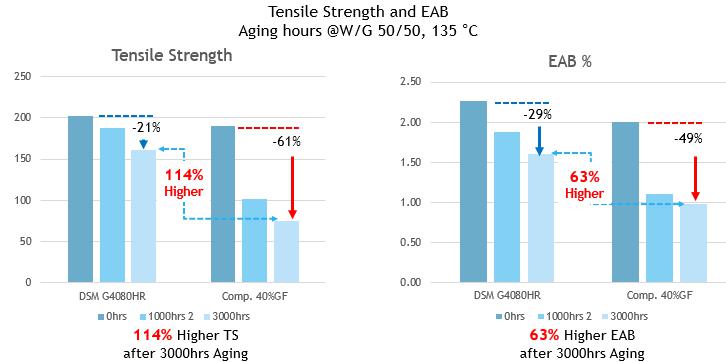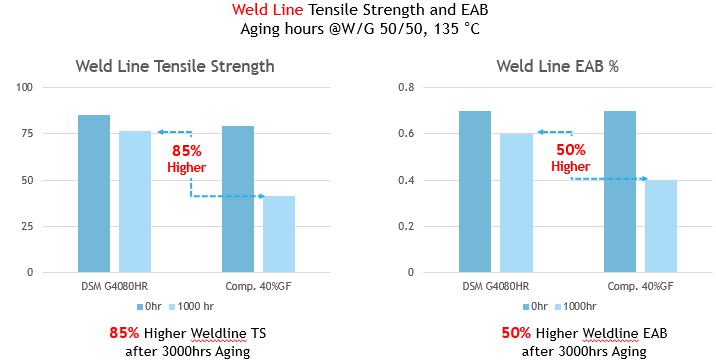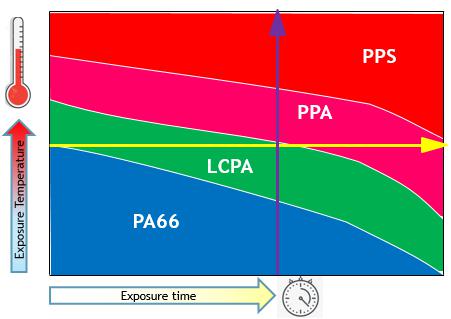HC Plastics News:
The Royal Dutch DSM Group, a global science company focused on nutrition, health and green living, has officially launched the XytronTM (PPS) G4080HR commercial engineering plastics product for the automotive industry, with better long-term performance and resistance to the most extreme conditions. Aging testing provides automotive companies with a more rational choice of automotive thermal management system (TMS) materials to optimize operating conditions, extend component life, reduce energy consumption, shorten design cycles, improve component versatility, and reduce costs. aims.
With the rapid development of automobile electrification, vehicle manufacturers and automotive thermal management system component suppliers are faced with complex market competition and increasingly demanding technical requirements, and the material selection of automotive thermal management systems has also undergone changes. Automotive electrification is rapidly developing on the two technical routes of hybrid vehicles and pure electric vehicles. They pose many challenges to automotive thermal management system engineering plastics from the two dimensions of temperature tolerance and tolerance time.
The introduction of the Xytron® G4080HR product facilitates the design flexibility, thin walling, and lightweight of automotive thermal management system components, while at the same time making the final component due to its superior aging resistance and weld wire strength retention. Long-term performance predictability is easier, and it is possible to save cost by reducing wall thickness for automotive thermal management system components.
The ultra-hydrolysis resistance of Xytron® G4080HR products provides long-term performance guarantees for material challenges in the automotive thermal management system. The aging test of 3,000 hours in 135 °C water glycol proved that the tensile strength and elongation at break of G4080HR showed excellent performance compared with similar products. The tensile strength decreased by only 21%. The drop was 61%, the strength performance after aging was 114% higher than that of competing products; the elongation at break of G4080HR decreased by only 29%, the competing product decreased by 49%, and the actual elongation at break after aging exceeded 63% of competing products.

DSM transforms electric vehicle thermal management system with more resistant materials
Innovative components of automotive thermal management systems inevitably produce weld lines in injection molding, which is a weak link in the overall structure. With the joint surface technology of DSM, the tensile strength and elongation at break of the G4080HR weld line are also greatly improved. Studies have shown that after 1000 hours of aging in a 135 ° C environment, the measured tensile strength at the weld line is maintained at 75 MPa, which is 85% higher than competing products, and the elongation at break is still 0.6%, which is 50% higher than competing products, indicating that The mechanical properties of the material bond line position can also withstand the rigorous aging test.

DSM transforms electric vehicle thermal management system with more resistant materials
In order to improve the long-term reliability of the cooling system, the new generation of electric vehicles is also considering the upgrading of the coolant. The different coolant resistance to the aging resistance of the material is the third dimension that affects the material selection. The choice of PPS that is resistant to strong sulfuric acid corrosion, especially the Xytron® G4080HR, undoubtedly minimizes the design impact of the coolant change factor.
DSM has accumulated experimental data on G4080HR relative to common products at different temperatures, times and media, including authoritative data from third-party certification bodies in Germany to help customers effectively predict the long-term performance and service life of their components. The Xytron® G4080HR brings more robust material solutions to OEMs and automotive thermal management system components, reducing the risk of retrofitting design and accelerating product development, and helping OEMs to maintain reliable automotive thermal management. System components are widely used in all types of vehicles.
Appendix: Comparative Analysis of Experimental Data of Various Engineering Plastics to Cope with Challenges
According to the resistance of various engineering plastics on the market to heat aging temperature and time, the following figure compares the mainstream engineering plastic materials of automotive thermal management systems such as polyphenylene sulfide PPS, high temperature nylon PPA, long chain nylon LCPA and nylon double six PA66. . The direction of the purple line indicates that the higher the heat aging temperature, the less the material can withstand, and the stability of PPS and PPA is highlighted in the heat aging temperature range exceeding 130 °C. The yellow line direction indicates that the longer the heat aging time, the less material selection. The material with the lowest mechanical degradation after high temperature and long-term aging resistance is PPS, followed by PPA, LCPA and PA66.

DSM transforms electric vehicle thermal management system with more resistant materials
The difference in aging resistance of different materials depends on the hydrolysis resistance of the material resin. The automotive thermal management system is based on coolant water glycol. At high temperatures, water is highly aggressive against many materials, called hydrolysis. The stronger the resistance to hydrolysis, the stronger the resistance. PPA, LCPA and PA66 belong to the nylon family. The resistance of the nylon amide bond is not enough. The PPA has the best hydrolysis resistance in the nylon family. It can be improved by hydrolysis resistance. PPS is different from nylon in its intrinsic molecular structure. The molecular structure of thioether bond plus benzene ring is simple and stable, and it can withstand the well-known concentrated sulfuric acid, so it is easier to resist hydrolysis. Electric vehicles should pay attention to the long-term performance under complex conditions, and PPS and PPA are recommended in the key components of automotive thermal management systems.
In addition, the engineering plastics used in automotive thermal management systems are made of resin and glass fiber. Another weakness of the aging resistance of the material is that the bonding surface of the glass fiber and the resin is separated and cracked by the influence of water. The better PPS glass fiber bonding surface determines the difference in aging performance between different PPS materials. DSM's technology can make the direct combination of glass fiber and PPS very tight, and the aging speed of PPS will be significantly reduced.
Experiments show that the same is 40% glass fiber reinforced PPS material, the atomic force microscope visually shows the difference between the aging surface. The white area of ​​each photo represents glass fiber, the yellow area represents PPS resin, and the black area represents the width of the joint surface gap. Before the aging, the glass fiber and resin bonding surface of the two materials can hardly see black, which means smooth and seamless, with time. On the other hand, the black area is wider and wider at the joint surface of the competing product (the second line), which means that the joint surface has deep cracks, and the joint surface of the DSM XytronTM (PPS) G4080HR product is aging at 3,000 hours and 135 °C. Only a thin mark appeared in the back, indicating that the combination of resin and glass fiber is still very close. Microscopic cracks are distributed on the surface and inside of the part. As the aging time or intense driving conditions are superimposed and extended, the parts will eventually crack or even damage, including well-known leaks.
DSM transforms electric vehicle thermal management system with more resistant materials
DSM – Fun Technology, Better LifeTM
The Royal DSM Group is a global science company with a goal-oriented, globally active nutrition, health and green lifestyle. DSM continues to promote economic prosperity, environmental improvement and social progress, creating sustainable value for all stakeholders. DSM offers innovative business solutions for human nutrition, animal nutrition, personal care and fragrance materials, medical devices, green products and applications, and new mobility and connectivity. About 23,000 employees of DSM and its affiliates have generated annual net sales of approximately 10 billion euros. The company is listed on the Euronext Amsterdam (Euronext Amsterdam). For more information, please visit .
DSM in China
DSM began trading with China in 1963 and established its first sales representative office and first production site in China in the early 1990s. DSM China Regional Headquarters and R&D Center are located in Shanghai. Currently, the company has 49 branches in China including 25 production sites and employs approximately 4,900 people. DSM's business in China has grown steadily and its sales in 2017 exceeded RMB 9 billion. For more information, please visit 
Editor in charge: Yao Chunlin
Bead Blasted Sheets,Bead Blasted Color Sheets,Bead Blasted Stainless Steel Sheet,Bead Blast Stainless Steel Decorative Sheets
Foshan Sunsteel Co. , Ltd , https://www.fssunsteel.com
